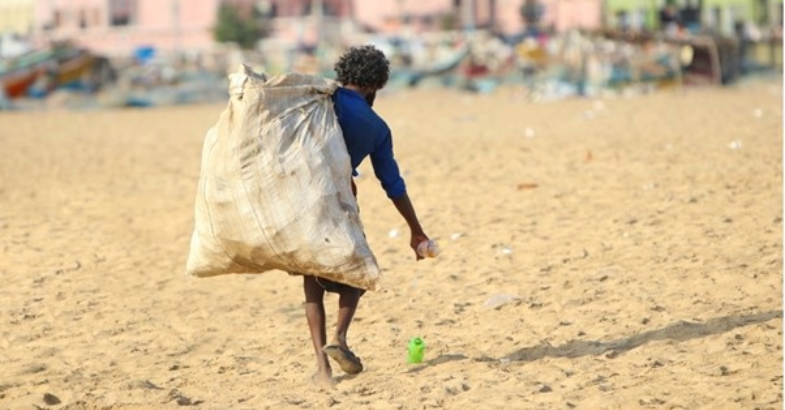
Introduction
India’s economic engine is running at full throttle. With a robust 6.5% GDP growth projected for 2024-2025, our nation is poised for a period of unprecedented expansion. But this remarkable ascent comes with a critical question: at what cost? As our cities swell and our middle class expands, so does a silent crisis – the relentless tide of waste.
Our conventional linear model of “take, make, and waste” is simply buckling under the pressure. Every day, we generate over 160,000 tonnes of municipal solid waste, yet a staggering one-third of it vanishes from the system. Only half of what’s collected is ever processed before ending up in our already overstressed landfills. The numbers in our megacities are even more alarming; Delhi and Bengaluru have seen waste generation skyrocket by over 2000% in just a decade and a half.
This isn’t just a public health and environmental challenge – it’s a massive economic opportunity in disguise. The circular economy (CE) offers a powerful alternative, one that redefines waste not as a nuisance to be discarded, but as a resource to be recovered. This transformative shift could unlock a market value of over $2 trillion and create nearly 10 million jobs by 2050. The next revolution isn’t just about economic growth, it is about making that growth sustainable, equitable, and intelligent.
A New Policy Ecosystem for a New Economy
India’s push toward a circular future is now backed by a maturing and increasingly robust legal framework. A landmark 2024 Supreme Court ruling has even given constitutional recognition to the right to be free from the adverse effects of climate change, establishing a powerful legal foundation for environmental action.
The most significant policy development, though, is the new Extended Producer Responsibility (EPR) Rules, set to come into effect on April 1, 2026. These rules represent a fundamental shift in our thinking. No longer is waste a municipality’s problem alone. Now, producers, importers, and brand owners will be held accountable for the entire lifecycle of their products, from plastic and e-waste to glass, paper, and metal packaging. By shifting the burden of post-consumer waste management to businesses, this policy creates a powerful incentive for companies to design products that are inherently recyclable and durable. It’s a move that forces “upstream” circular thinking – where a product’s end-of-life is considered at its very beginning.
This top-down push is complemented by state-level vision. Andhra Pradesh’s 2025-2030 circular economy policy, for instance, is a pioneering effort with ambitious zero-waste goals and a focus on creating new Micro, Small, and Medium Enterprises (MSMEs) that convert waste into valuable products. Backed by a ₹904 crore initial allocation, this initiative shows how clear policy can be paired with significant investment to create tangible results.
Overcoming the Behavioural Hurdle: The “Intent-Action Gap”
While policy provides the framework, the circular economy won’t succeed without a fundamental shift in consumer behaviour. A recent study by the SPJIMR WISE Tech Centre highlighted a critical “intent-action gap” among Indian consumers. The research revealed that while a remarkable 84% of consumers express a preference for sustainable products, only 27% consistently follow through with a purchase.
So, what’s stopping them? The primary culprits are price, trust, and convenience. Sustainable products are often perceived as being too expensive, a barrier for an estimated 88% of consumers. This is compounded by a fundamental lack of trust in brand claims. With so many companies making vague “green” claims – a practice known as greenwashing, consumers are becoming increasingly sceptical.
The government is tackling this head-on. The new “Guidelines for Prevention and Regulation of Greenwashing” introduced by the Central Consumer Protection Authority (CCPA) will impose fines and other penalties on companies making unsubstantiated claims. This regulatory move is designed to rebuild consumer trust, which, if successful, can weaken the price barrier by strengthening the perceived value of a sustainable product.
Finally, a lack of availability and convenience makes it difficult for even the most well-intentioned consumers to make a sustainable choice. Addressing these three barriers in a coordinated way is crucial for closing the intent-action gap and bringing circularity into the mainstream.
The Unseen Engine: Empowering the Informal Sector
Any conversation about India’s waste ecosystem is incomplete without acknowledging the informal sector. This “invisible army,” estimated to number between 1.5 to 4 million individuals, is the very backbone of the country’s recycling chain. They are the reason over 80% of recyclables like PET and e-waste are recovered. In Delhi alone, they recycle an estimated 20-25% of the 10,000 metric tons of waste generated daily, all at little to no cost to the city.
Yet, this indispensable workforce exists on the margins of society. They face social stigma, significant health hazards, and a lack of legal and social security. Ironically, the very formalisation and privatisation efforts meant to improve waste management can sometimes displace them. The new EPR rules, which favour engagement with formal, registered entities, pose a particular risk, as the bureaucratic requirements are often beyond the reach of these workers.
The solution isn’t to replace this workforce but to empower and integrate it. This is where technology and a cooperative model come in. Mobile apps are being used to enumerate and validate waste pickers, providing them with official ID cards and connecting them to social welfare schemes. Furthermore, organisations like the Self-Employed Women’s Association (SEWA) and Hasiru Dala are proving that the cooperative model works. By organising waste pickers into formal collectives, they can secure direct collection contracts with municipalities and businesses. By channelling EPR funds toward these inclusive models, we can strengthen the informal sector, turning a social challenge into a massive economic and environmental opportunity.
The Way Forward: A Unified Vision for 2030 and Beyond
India’s journey toward a circular economy is at a critical juncture. The path forward requires a shared vision that moves beyond fragmented efforts to a unified, scalable system. We need targeted, significant investment in high-quality, closed-loop recycling infrastructure to meet the ambitions of our new policies. And our future EPR frameworks must explicitly mandate the inclusion of the informal sector, ensuring a just and equitable transition.
Technology will serve as a powerful catalyst. AI-driven robots can automate waste sorting, and IoT sensors can optimise collection routes. Blockchain can provide the transparency needed to track products throughout their lifecycle, directly combating greenwashing and rebuilding consumer trust.
Ultimately, however, the success of this revolution depends on a cultural shift. This is a shared mission that requires aligning top-down policy with ground-up innovation. It’s about using technology and cooperative models to formally and equitably integrate the informal sector. By doing so, we can ensure that India’s circular economy is not just efficient and profitable, but also socially just, creating a future that is both environmentally resilient and truly inclusive.

Author’s Bio:
Rishik Reddy is a student of the Post Graduate Programme at the Indian School of Business (ISB), driven by a vision to transform education. Drawing on his experience in product innovation at Wells Fargo and Samsung R&D Institute, he now applies technology to bridge the gap between learning and employability. With 29+ technology patent disclosures, he has a proven track record of building scalable and sustainable solutions to complex problems. His work reflects a consistent belief in designing solutions that are not only impactful, but also enduring and responsible.

Author’s Bio:
Harshitha Mankal is a student of the Post Graduate Programme at the Indian School of Business (ISB), with a specialisation in the intersection of data-driven strategy and business growth. With a strong academic background in business analytics, marketing, and general management, she is passionate about policy design. Her professional journey includes spearheading growth and CRM initiatives at a founder’s office. She is also the founder of an NGO and her own creative venture- a plant terrarium business, reflecting her deep commitment towards sustainability.

